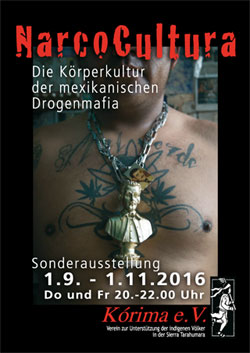Back after a long time. On Thursday afternoon Magdalena and I land in Chihuahua, Isela Gonzales - the director of our partner organisation Alianza Sierra Madre - and her daughter pick us up at the airport. We'll get straight to the point. What has changed in the last few years? Some former employees now work in government organizations, trying to promote human rights work, but continue to support Alianza.
The next day, a first exchange of information takes place in the office. Isela has been in Geneva this year with the International Peace Brigades to report to the Human Rights Commission on the situation in the Sierra. Alianza works with various non-governmental organizations in Mexico, but also with many international organizations and three lawyers specializing in international law.
And we get to know the young anthropologists Paloma and Efrén, who work with commitment and also lovingly take care of the displaced six-person family from Baborigame, who have found temporary emergency accommodation in the office. They had to flee from their rancho after being severely threatened. The ten-year-old daughter was raped. The children are traumatized and need psychological care. But also food, clothing, school lessons, toys and other distractions (sports and sewing courses) have to be organized.
Lawyer Ernesto Palencia believes that Alianza's work has changed considerably over the past two years. He compares it to the work in the emergency room of a hospital: "There are so many emergencies that must be responded to immediately in order to prevent worse. This robs a lot of power and energy.
At the moment, three displaced families are being cared for by the Alianza, more than forty people have been displaced from Coloradas de la Virgen and the number is increasing. The Mafia's thugs want the land of the indigenous people and their ranchos and resort to increasingly brutal means. They drive away the cattle, destroy the harvest and thus the livelihoods of the families and in some cases this behavior is supported by the local police.
The next day we drive to Guachochi to meet Prudencio Ramos from Choréachi (Pino Gordo) and his team. They report on their study. Since October 2016, young people has been sent out with cameras to photograph animals and plants in their territory. The data are compared with a study carried out in 2000/2001 by an international group of experts and show that some species are threatened or have disappeared as a result of climate change and others have been added. The young people are very proud of the meaningful results they have collected under difficult conditions. Almost invisible and agile, they roam the areas of the drug mafia, they know their way around and can avoid danger. No one can take responsibility for international scientists during this period of violence.
Shortly after returning to Chihuahua, we pack our bags again to attend a three-day conference on maternal health and maternal mortality in the Sierra Tarahumara in Hidalgo del Parral. The workshop was organized by Alianza in cooperation with the state COEPI (Comisión Estatal de los Pueblos Indígenas). Doctors, nurses and representatives of medical emergency services were represented. Thirteen indigenous people from Choréachi, including many Owirúame (traditional healers), were escorted to the venue by a police escort for safety reasons.
This was the kick-off event for a series of other meetings planned for the next five years. The focus is on intercultural exchange. It makes the work of doctors and nurses easier if they are familiar with the way of life of the indigenous people. And the indigenous people will also be able to reduce their fears of contact if they know what to expect from hospitals.
An important topic was the early detection of alarm signals during pregnancy in order to be able to react immediately. In Parral we visited a hostel for pregnant women. Here, women can be cared for before and after birth if complications occur.
All those involved were very pleased with this initial exchange and are very enthusiastic about the preparations for the next meetings.
Ellen Schriek
















